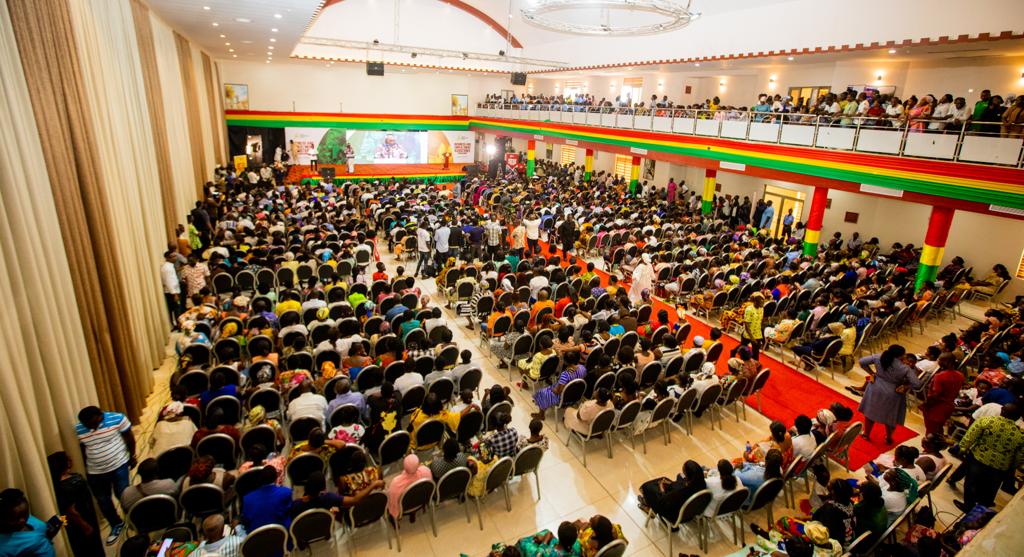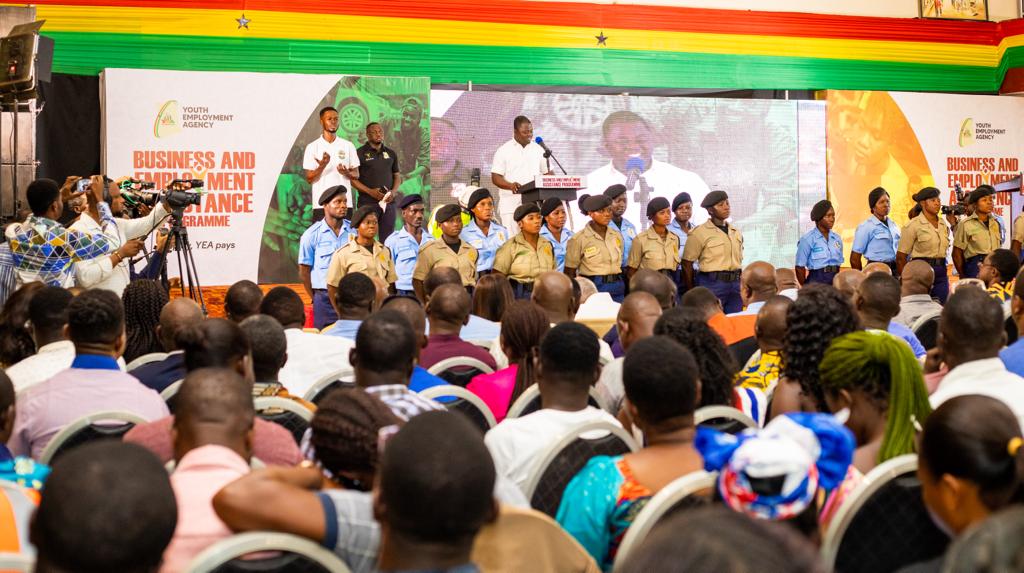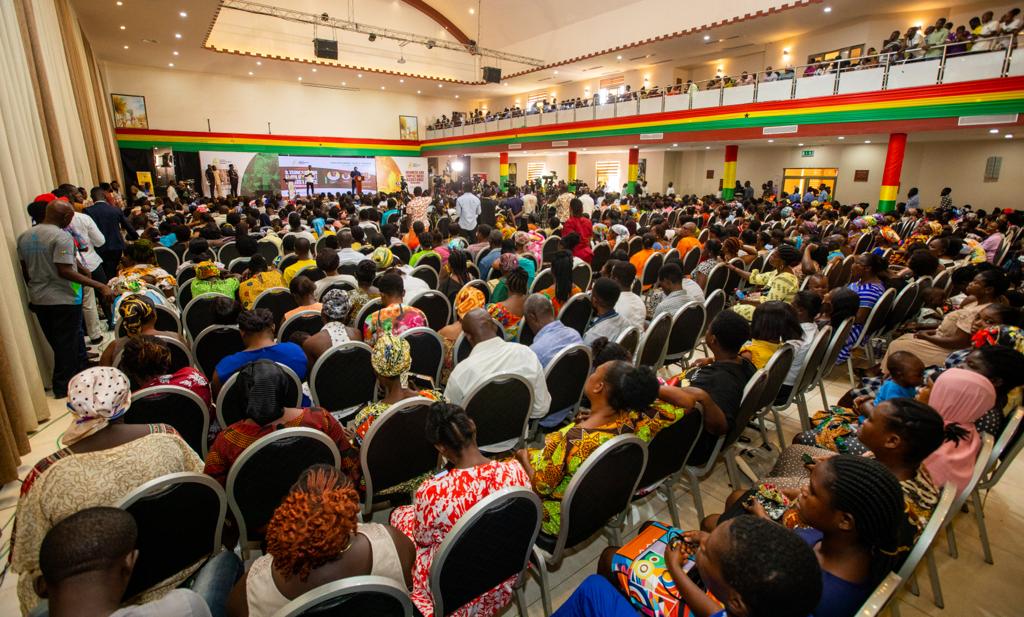The Vice President Dr. Mahamudu Bawumia has launched one of the Youth Employment Agency’s (YEA) flagship programmes, the Business and Employment Assistance Programme (BEAP), in the capital of the Bono Region, Sunyani.
This initiative aims to nurture young entrepreneurs, empowering them to generate employment opportunities for the large pool of unemployed youths in the country.
Addressing the event, the Vice President noted that the introduction of the Business and Employment Assistance Programme by the YEA, is a testament to the Agency’s commitment to the cause of providing sustainable employment for Ghanaian youth.
He stressed the fact that the YEA has over the years implemented several initiatives and programmes as part of efforts to mitigate the youth unemployment menace including engaging 21,000 youth under the Community Police Assistants and Community Health Workers module and 2,000 youth under the Youth in ICT module in collaboration with the Ghana Digital Centres Ltd.
He mentioned that, a partnership with the National Entrepreneurship and Innovation Programme has resulted in the training of 15,000 Ghanaian youth in business skills, corporate compliance, and financial sustainability practices.
“Another partnership with the Ministry of Food and Agriculture will engage 20,000 youth under Phase 2 of the Planting for Food and Jobs programme,” he said.
Dr. Mahamudu Bawumia also mentioned that the Agency has collaborated with the Ghana TVET Service and the Ghana Energy Commission to train 20,000 Artisans as plumbers, tilers, masons, beauticians, fabricators, glazing workers, carpenters, electricians and that under this module, beneficiaries will be duly certified after training and provided with the requisite tools and equipment to set up enterprises of their own.
The business sector, he said, was particularly affected by the pandemic amid closure of businesses during the partial and total lockdown posed liquidity challenges for some businesses and subsequently led to employers laying off staff or having to reduce staff salaries in a bid to keep businesses afloat.
He said: “The Ghana Business Tracker Survey conducted between May and June 2020 by the Ghana Statistical Service in collaboration with the World Bank and the United Nations Development Programme, indicated that as a result of the COVID-19 pandemic, 46.1% of Ghanaian businesses had to reduce wages whereas 4.1% of businesses laid off workers.”
Government initiatives such as the Corona Virus Alleviation Programme – Business Support Scheme (CAP-BuSS) and the COVID-19 Alleviation and Revitalization of Enterprises Support (Ghana CARES) have provided financial support in the form of grants and soft loans to Ghanaian business to help them mitigate the challenges faced as a result of COVID-19.
Despite these initiatives, he said, some businesses have still not fully recovered and need all the available assistance to help them get back on their feet.
According to him, there still exist some associated problems businesses face including financial distress, the increase in youth unemployment and chronically low wages, hence the birth of the Youth Employment Agency’s Business and Employment Assistance Programme.
“This initiative seeks to assist employers to re-employ laid-off workers and retain existing employees by providing a maximum of Five Hundred Ghana Cedis (GHS 500.00) per employee as salary support….I am particularly excited about the relief this initiative will provide to the Ghanaian youth, a demographic that is very dear to me. The youth of this country are our greatest resource, and it is our collective duty to ensure that they are well-positioned to make significant contributions to the economic development of our dear nation.”
He averred that President Akufo-Addo government has implemented several youth-focused initiatives specifically seeking to address the challenges faced by the Ghanaian youth.
“The YouStart programme, one of such government initiatives, was successfully piloted with 70 beneficiaries and an amount of GH¢1.98 million disbursed to support youth-led (below the age of 40 years) SMEs. This initiative will be further augmented to effectively assist more youth-led businesses in the coming years.”
He pointed out that government is very much aware of their complaints and concerns and is very committed to creating a favourable business environment for existing and emerging businesses.
Dr Bawumia commended the Board and Management of the Youth Employment Agency for their unwavering commitment and dedication to fulfilling their mandate towards the Ghanaian youth.
On his part, the Chief Executive Officer (CEO) of YEA, Kofi Baah Agyepong explained that comprehensive information and real-time updates will be disseminated across all of the agency’s social media platforms.
The programme he said, holds the promise of not only supporting young businesspeople but also addressing the pressing issue of youth unemployment in the country.
He said, a substantial amount of One Hundred and Twenty Million Cedis (GH¢120 Million) has been earmarked a for BEAP and is anticipated to benefit 10,000 MSMEs and 20,000 young Ghanaians, serving as a beacon of hope for those navigating the aftermath of the global economic downturn.
Kofi Baah Agyepong said: “The severe impact of the COVID-19 pandemic on businesses nationwide, BEAP comes as part of the Akufo-Addo government’s COVID-19 Economic Recovery Programme (COVID-19 ERP). This initiative, in response to economic challenges, seeks to rejuvenate businesses and provide a much-needed boost to the economy.”
BEAP, spearheaded by the YEA, aims to offer critical support to micro to small-scale enterprises.
The primary objective is to revive MSMEs affected by the global pandemic, enabling them to rehire laid-off employees, employ new workers, and provide essential skills for enhanced productivity.
The allocated GH¢120 Million will be distributed among beneficiary MSMEs, with each expected to engage a maximum of five (5) employees. Employees will receive a monthly allowance of GH¢ 500 as a top-up to their regular salary for one year, offering crucial support for businesses to recover and expand.


















